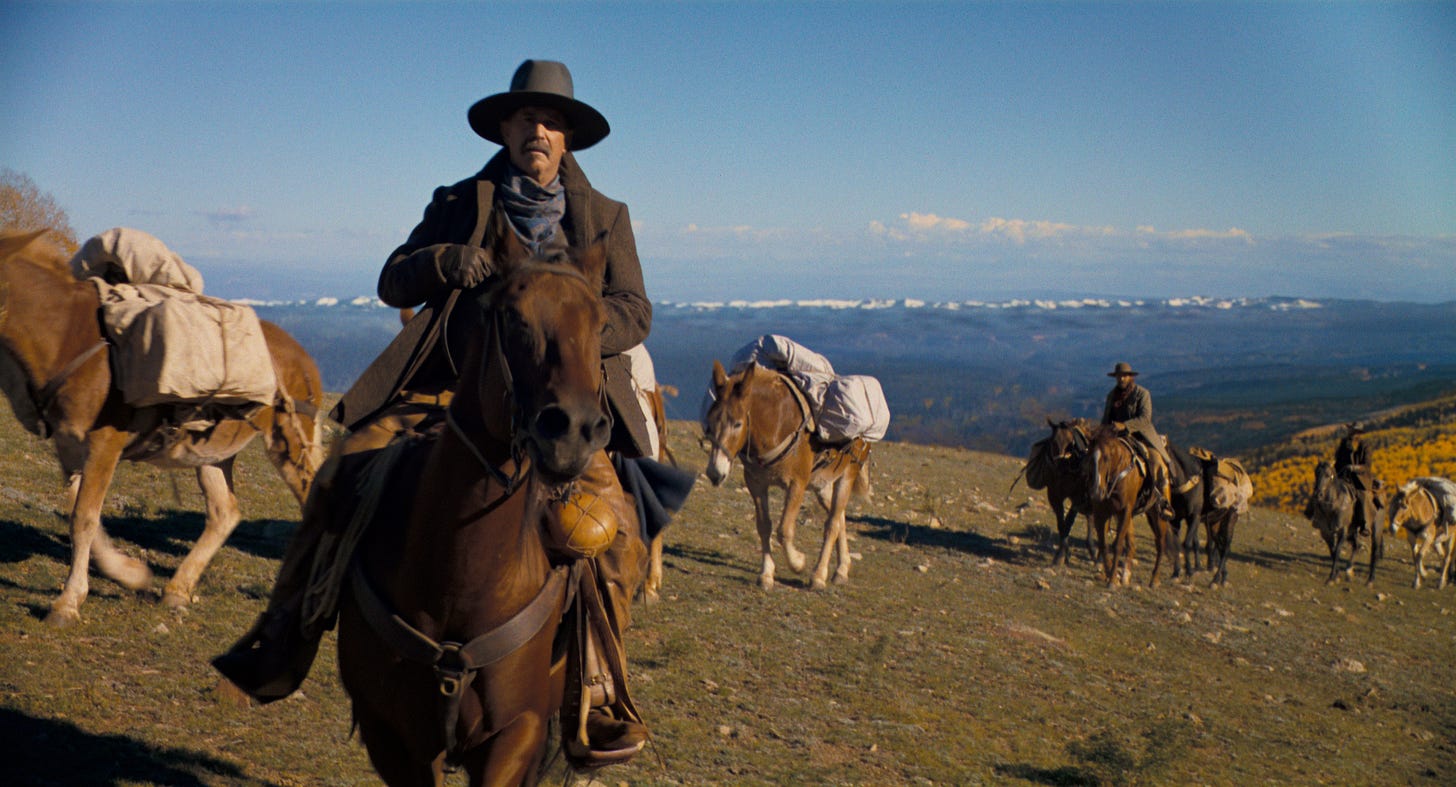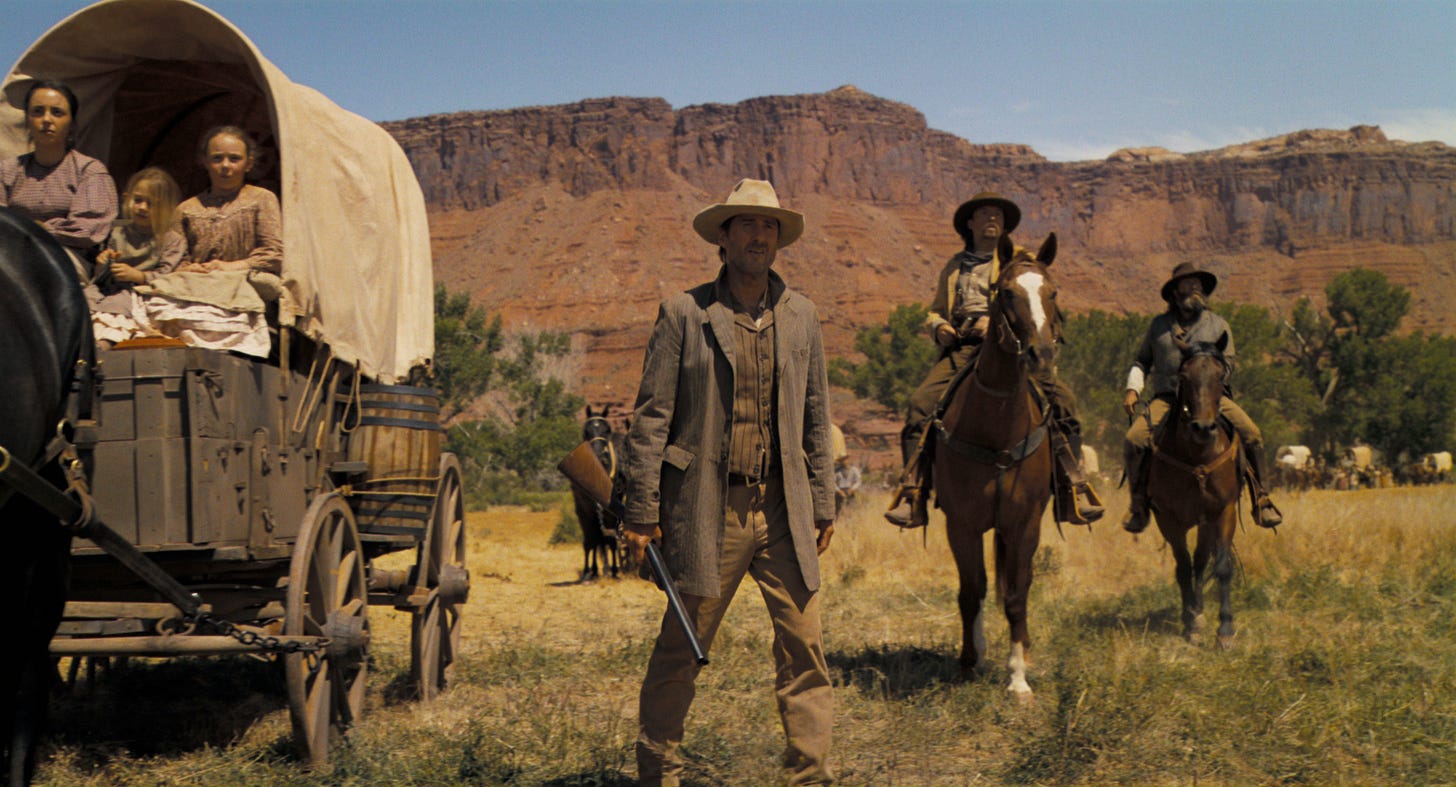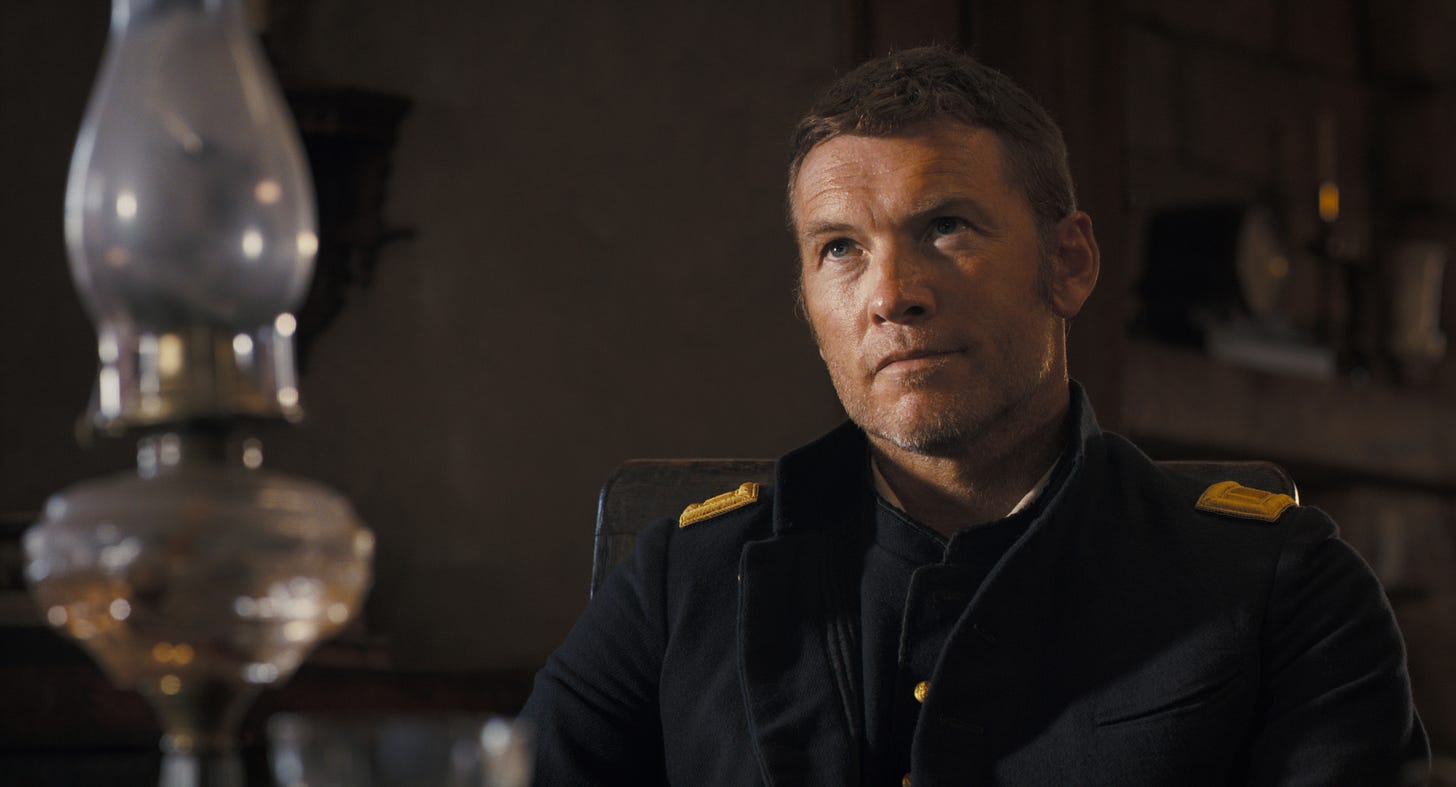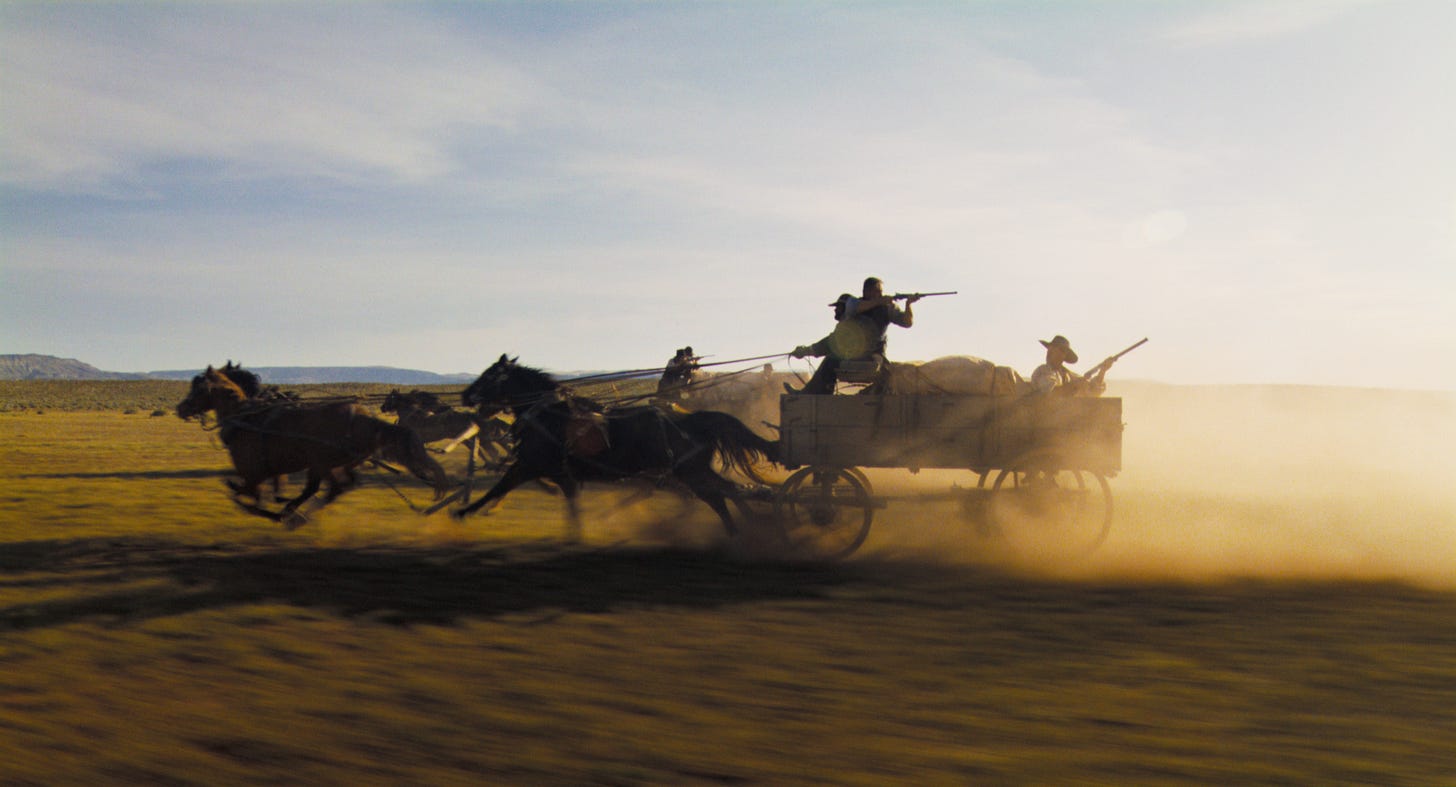A Day with Kevin Costner: Horizon 1+2, Venice Film Festival 1.4
Watching both Horizons, the press conference, and sitting in front of Kevin Costner: my final day at the Venice Film Festival.
Overture
It’s the final day of the Venice Film Festival. The schedule is limited, the awards are handed out in the evening, and everyone brought their luggage. Through a week of blazing sun, and two days where the humidity broke, the world’s second biggest film festival chose a fitting end: a double-feature of Kevin Costner’s two newest films, Horizon: An American Saga – Chapter 1 and Horizon: An American Saga – Chapter 2. One in the morning, one in the afternoon, Aperols in the evening.
Expecting the worst, I arrive one hour before the 9AM start-time of Chapter 1 and find a fatigued bunch of festival-enders. The people showing up early this Saturday morning on the final half-day of a festival are either the been-here-since-day-one die-hards or oh-shit we forgot about the festival is there anything we can get last minuters? As opposed to Berlinale, which reserves the final day as “public day,” where almost all films are available to the public, Venice had public screenings dispersed throughout the festival.
Anyway, I get my espresso doppio, due cornetti, and wait. The weather today is the best of the entire festival, the sun has yet blazed a layer of gunky sweat on everyone and it isn’t too breezy overcast. I enjoy it for now, as I see that Chapter 1 is 181 minutes long, one whole minute longer than Oppenheimer. Although this film was theatrically last month after its Cannes premiere in May, I was waiting for this double-feature day, when it would be me and the Cos.
Horizon: An American Saga – Chapter 1
I’m not familiar with Yellowstone, or 1883, or 1923, or whatever other TV shows Taylor Sheridan cooked up (I did enjoy his screenplays for Sicario and Hell or High Water though). As I understand them, they are American television shows with a very specific demographic that I have not reached in my spry age. They star humans like Kevin Costner, Sam “angry that a woman made a Western” Elliott, Helen Mirren, and Harrison Ford. I heard that Costner fell out with the producers of Yellowstone, or something like that, and that he’s a major asshole to work with. I’m sure the guy who plays his own band’s music on his sets with control issues on a production he wasn’t numero uno definitely left because of “creative differences” and nothing else.
Costner took his saddle elsewhere, along with his pocketbook. The juice from being on Yellowstone, at some point the most watched show if you don’t count streaming and YouTube and TikTok and Instagram and basically any other form of video, allowed him to put that saddle on another horse. Having not made a film since Open Range, which was over twenty years ago, he decided to return to the genre that failed him a couple times but also provided him with two Oscars in 1990, Dances with Wolves, his directorial debut. From this insane success financially and critically, Costner made a handful of films for a decade before returning to roles not directed by him. After seeing and realizing the replicability of success with Yellowstone, Costner made his own version that’s been gestating for two decades.
The result: a three-hour meh. It’s incredibly misleading calling Horizon a film. Instead, which is actually interesting, he made three episodes of a TV show, stitched them together, and called it a movie. Due to my particular disdain for episodic audiovisual storytelling, I could spot this cowboy soap opera from a mile away. It has all the usual motifs of a Western: hats, dust, Monument valley or something similar, guns, Indian baddies, White baddies (and goodies), open ranges, open plains, open prairies, grass, rivers, sky, the usual. As in episodic TV, a series of stories are developed through inciting incidents to get us hooked to each one, which are then cross-cut with galloping force to create the illusion of energy. And that’s what Chapter 1 is, a set-up of various stories with actors we’ve seen before leading each of them (Kevin Costner, Sam “only does three hour epic sequelized film series” Worthington, Luke Wilson, and a little bit of Giovanni Ribisi—that is not a joke about his size, I swear, rather his screentime.
Costner plays a herd pusher, Worthington is a Union officer sent in the aftermath of an Apache raid on a settler village, Wilson is leading a Sante Fe wagon train, and Ribisi is running a Chicago printing house selling land in the West called “Horizon.” In between and inside each of these threads are numerous other stories like matryoshka dolls. As stated in the press conference after the viewing, Costner said that he counts these smaller moments in the story of the West as just as important as the action scenes; that life at this time, beginning in 1859, was horrific and difficult in every quotidian way possible. Costner is annoyed at Western films only wanting to get to the fight without much substance, as if the genre never had a time when every possible angle was explored in different historical, political, social, and aesthetic waves.
This aversion to the action scene is by no means shirked, which he includes several times in both films. The biggest problem, besides from the fact that it’s a TV show pretending to be a movie, is Costner’s resilience to any forms of aesthetic energy at all, gunfights or otherwise. It feels like a show without the directorial stamp of an individual trying to make a point other than: man, wasn’t life something back then?
Interlude: Kevin Costner and the presser
Kevin Costner started his address by calling Venice a magical place, not a bad start, trying to compare it with the brutality of the American West back in the day. He then said he wanted women in all his storylines front-and-center who we experience the events through, but they tended to be functionaries of the male characters rather than the viewer avatars. (He talks about a spoiler from Chapter 2 that I will not mention about a woman who gets treated quite bad.)
Going back to the brutal West, he says it isn’t Disneyland—perhaps confusing the house of mouse with the old west town at Knott's Berry Farm. Asked about the politics and the film’s relationship to today, he explains that it’s a reminder, not a message, to the country. The US was formed and moved by inches of hardships and toil, and I think he’s implying that this current state of disarray is spitting in the faces of all those sacrifices. He explicitly says there’s no political message.
(Throughout the presser, Costner was wearing the translation headphones even though everyone was speaking English, which I thought was funny until he said that he was wearing them because his hearing was bad from being in a rock n roll band, which I then thought was hilarious. Not the band part, which I knew about, but wouldn’t wearing headphones make hearing more difficult? They don’t play the English through it or anything.)
I was busy thinking about this for ten to fifteen minutes, then Costner was closing his remarks by saying that the release of Chapter 2, which was supposed to be weeks after Chapter 1, was delayed because of the studio, not by his own decision, and neither was the original release date. He had always wanted, he says, to release Chapter 2 five or six months after the first, you can’t have TV show episodes that far apart!
He finally closes by threatening us all Chapters three and four, set ten years later and then another ten years after that. He claims Chapter 3 is devastating (because he’s still looking for funding/sales/partnerships). At the slightest indication that his address was over, press agents from Spain to Germany to Italy swarmed the stage to get Costner’s autograph and/or photo, as well as Luke Wilson’s, who was present throughout but I can’t recall if he said anything (jk, he talked to the old Italian woman sitting next to him).
I leave through the back without any resistance, immediately went to get a pizza margherita and espresso, and afterwards write the ‘Overture’ and half of ‘Horizon: An American Saga – Chapter 1’ sections above. I’m now sitting con Aperol at the hostel finishing the rest (and now editing back in the safety of my bedroom).
Horizon: An American Saga – Chapter 2
As luck, or fate, would have it, I accidentally booked the premiere screening of Chapter 2 with the cast and crew in attendance, a practice I usually avoid because of the extra time needed to applaud and introduce and such. As further luck would have it, I was sitting through this 190-minute slug with Costner and Perry and the rest of them two rows behind me.
I seriously questioned whether I should attend or not, given its advanced runtime and my now solid prediction that it’s going to be episodes 4, 5, and 6 of the Horizon TV show rather than a standalone film. We’ve all made this mistake before. After more pizza digestion, I gathered the courage and went!
My prediction was true, the film is another several episodes of a TV show I wasn’t into. (Don’t make me recount the plot because I forgot most of it besides the r*ping.) Stakes continue growing, several smaller resolutions are resolved, and other smaller problems develop. But nothing ever rises to the level of cinematic. Everything is subdued in both Horizons and I’m not sure why. Maybe Costner’s cooked. Maybe Kevin kan’t. I think that as many cases may be, Costner got extremely, extremely, extremely lucky that as a major A-list superstar, his first film won the big two Oscars. Go watch Dances with Wolves again, it’s incredibly average. Compare that to the other 1990 releases: Goodfellas, Wild at Heart, The Hunt for Red October, Total Recall, even The Godfather Part III. Costner got a blank check out of pure luck, not because he had a masterful, directorial vision to sustain him over three decades.
It’s clear that when Costner is asked why he returns to the Western over time, his line explaining that he likes the drama of lawlessness, is just obscuring the fact that this is his genre safe space. Also, something he’s more open about revealing is that he knows his audience isn’t showing up to theaters opening weekend, which is why the box office of Chapter 1 is so low. They’re the kind of audience who buys DVDs, not even Blu-rays, if you know what I mean. (They also buy NCIS and Blue Bloods on DVD, further proof, your honor, that Horizon is in fact a TV show and not a film series.) Before turning this post into a bloated subtance-mess like what these movies are, I’ll conclude by recommending that you don’t watch these unless you were born before 1967. That seems like the appropriate cut-off year and I don’t know why.
Here is a video I took of Costner getting his standing-O after the screening:
I still have a couple more posts from the festival, so subscribe if you’d like to read more.







